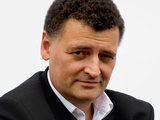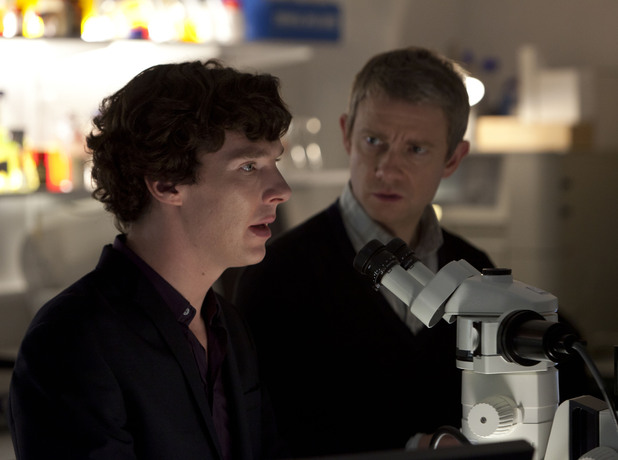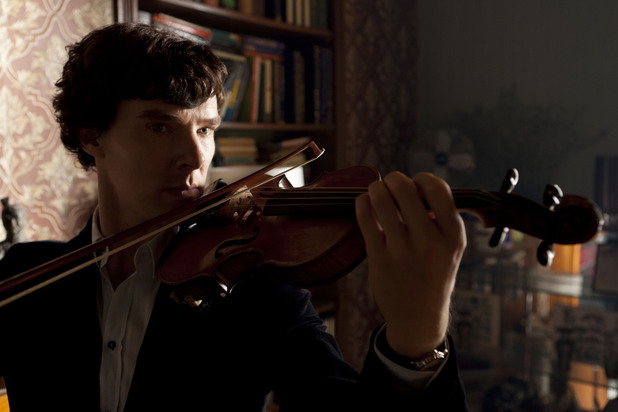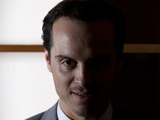
© BBC / Jon Pountney
It's time for the great detective to bid adieu once more - the second series of Sherlock comes to an end this Sunday night. The genius crime-solver (Benedict Cumberbatch) is forced into a deadly confrontation with his arch-foe (Andrew Scott), but will either man survive the Reichenbach fall?
To mark this year's momentous finale, Digital Spy caught up with series co-creator Steven Moffat to chat about Moriarty, the possibility of a third series and the future of John and Sherlock's relationship...
First of all, how long did it take you to come up with the resolution to series one's cliffhanger?
"I always felt that coming up with the cliffhanger resolution was actually relatively easy. In my mind, I thought 'Maybe we don't even resolve it that week, maybe we just cut to them having an adventure and we go back to it'. For me, that cliffhanger really was an impasse, at which point everyone would just back away.
"But it became such a big deal that we actually had to do something - the most unexpected thing. I remember the three of us - Mark [Gatiss] and I and Steve Thompson - were out one night and just thought, 'What if the phone rings?' It's ridiculous, it'll be funny.
"I mentioned this to Sue [Vertue] - my wife, the producer - and she'd just heard the funniest story about a funeral where the service started, and someone's phone started playing 'Stayin' Alive' - I said, 'That's the one!' I'm very proud of it. Of all the things that people had been wondering about for over a year, I don't think they expected the Bee Gees!"
Did you feel any pressure this year after the enormous success of series one?
"I did a sitcom - Chalk - that wasn't very successful, and we did a second series knowing that the first series had tanked. That was pressure! Coming back to a second series of something that's been so beloved - there's pressure, because there's always pressure - but it's incredibly exciting.
"There's a new spring in the step of the show, I think, particularly with Benedict. As he brilliant as he was, suddenly he knows he's a star. Same thing happened with Matt Smith - you saw it in last year's [Doctor Who] Christmas special. It was the first time Matt had played the Doctor knowing that he was a hit. You're seeing Benedict flourish into it, and just being such a star."
To mark this year's momentous finale, Digital Spy caught up with series co-creator Steven Moffat to chat about Moriarty, the possibility of a third series and the future of John and Sherlock's relationship...
First of all, how long did it take you to come up with the resolution to series one's cliffhanger?
"I always felt that coming up with the cliffhanger resolution was actually relatively easy. In my mind, I thought 'Maybe we don't even resolve it that week, maybe we just cut to them having an adventure and we go back to it'. For me, that cliffhanger really was an impasse, at which point everyone would just back away.
"But it became such a big deal that we actually had to do something - the most unexpected thing. I remember the three of us - Mark [Gatiss] and I and Steve Thompson - were out one night and just thought, 'What if the phone rings?' It's ridiculous, it'll be funny.
"I mentioned this to Sue [Vertue] - my wife, the producer - and she'd just heard the funniest story about a funeral where the service started, and someone's phone started playing 'Stayin' Alive' - I said, 'That's the one!' I'm very proud of it. Of all the things that people had been wondering about for over a year, I don't think they expected the Bee Gees!"
Did you feel any pressure this year after the enormous success of series one?
"I did a sitcom - Chalk - that wasn't very successful, and we did a second series knowing that the first series had tanked. That was pressure! Coming back to a second series of something that's been so beloved - there's pressure, because there's always pressure - but it's incredibly exciting.
"There's a new spring in the step of the show, I think, particularly with Benedict. As he brilliant as he was, suddenly he knows he's a star. Same thing happened with Matt Smith - you saw it in last year's [Doctor Who] Christmas special. It was the first time Matt had played the Doctor knowing that he was a hit. You're seeing Benedict flourish into it, and just being such a star."

And were you nervous about tackling the most iconic stories in the Holmes canon?
"We're fanboys of Sherlock Holmes, so we can't wait! Someone asked [myself and Mark] what we do when we disagree, and we realized - slightly chillingly - that we never do! We can barely get the sentence out before the other's completing it. We're so in concert on this stuff, and we're interchangeable in interviews. I swear, he could take over this interview and you wouldn't know the difference, except I'd suddenly have become better looking and better dressed!
"We're very, very old friends, so we're having about as much fun as we could ever imagine having! I remember once, back in [BBC Wales studio] Upper Boat, you had the TARDIS in one studio and the next studio was 221b Baker Street. Mark grabbed my arm and said, 'It's like a map of our brains!'"
Having been a success, was it easier to forget the likes of Basil Rathbone and Jeremy Brett, and write your own take on Holmes?
"To be honest, I don't think we ever really forget them, because we love them. I still watch Sherlock Holmes films, if anything with more excitement, because I've been there. I still watch old Doctor Who and think, 'I've actually done that'. I admire Basil Rathbone's Sherlock Holmes, Jeremy Brett's Sherlock Holmes, Robert Stephens' Sherlock Holmes [from 1970 film The Private Life of Sherlock Holmes] so, so much - [this show] hasn't tarnished the joy I take in that at all.
"But at the very beginning, we had a moment of trying to decide how Sherlock would talk in the modern world. You can't make him talk like a completely modern person, so how far do we go?
"Mark was the first person to put pen to paper this year and he was struggling to find the modern Sherlock's voice again. By the time I turned up to do mine, I'd been pre-warned, 'You'll find it harder than you think to get that feeling back'.
"But I think Sherlock's shifted slightly this year - I think he's shifted slightly more Victorian, just a little. We were always very cautious in the first series that he never sounded like he's giving a lecture, but Benedict's got that beautiful voice and you sort of want him to give a lecture! So we've shoved him a little bit that way.

"It's really only a matter of phrasing. I mean, I don't believe that a modern young man would actually say 'Elementary' - I just don't. But I believe that he would say something equivalent. If you look at the Sherlock Holmes [adaptations] that have failed - and there are quite a few - smugness and prissiness are the two things that really kill him.
"Basil Rathbone is amazing - he's never smug and he's never prissy. He actually seems like quite a bloke, quite a geezer. You think he'd probably punch your lights out! And yet he does all of the deductions very authoritatively.
"Whereas Jeremy Brett has a completely different take - it's a very audacious and very clever take, but you still never feel that he's prissy or smug. And Benedict has just made him such a leading man. He's just flourished and made him a romantic lead."

Moriarty returns in force this week. This show's take on the character is rather unusual...
"It's an odd one with Moriarty. I think with Sherlock and John, we've actually stayed quite close to the original, but just modernised them. The scenes with Moriarty in the original are brilliant, but every single super-villain who's ever in comics or novels or movies ever since has been an imitation of him.
"If we did Moriarty that way now, he would look like a hoary old take-off of a super-villain. That's not going to work - it's been done brilliantly too many times and spoofed too many times, we couldn't do that. So we just thought, what would really scare Sherlock Holmes?
"Andrew Scott became a star - which he absolutely deserves to be - on the basis of being in the last three or four minutes of Sherlock. His screen-time was tiny but it's a measure of that man's extraordinary talent that he's become such a big deal so quickly. He's a genius."
Are you planning to make a third series of Sherlock?
"If he survives!"
But are there still elements from the canon that you're desperate to adapt?
"If he survives... there's a whole bunch of details that have never been mentioned before in any film - stuff that we love. The meeting [between Sherlock and John] - I think it's maybe, in the 200-odd Sherlock Holmes dramatisations, it's maybe the third time it's been done. And it's a great first meeting - it's a flat-share. It's flat-share detective thriller comedy - how can you not do that?!
"I don't know if we'll do anything with this, but the fact that Doctor Watson is married for loads of the stories is really interesting. He and Holmes don't always live together and I think that's become a lazy way of doing Sherlock Holmes - they always live together. They didn't actually and why would they? Nobody flat-shares forever, so there's loads of details we can get in there..."
Sherlock concludes on Sunday (January 15) at 9pm on BBC One.
"It's an odd one with Moriarty. I think with Sherlock and John, we've actually stayed quite close to the original, but just modernised them. The scenes with Moriarty in the original are brilliant, but every single super-villain who's ever in comics or novels or movies ever since has been an imitation of him.
"If we did Moriarty that way now, he would look like a hoary old take-off of a super-villain. That's not going to work - it's been done brilliantly too many times and spoofed too many times, we couldn't do that. So we just thought, what would really scare Sherlock Holmes?
"Andrew Scott became a star - which he absolutely deserves to be - on the basis of being in the last three or four minutes of Sherlock. His screen-time was tiny but it's a measure of that man's extraordinary talent that he's become such a big deal so quickly. He's a genius."
Are you planning to make a third series of Sherlock?
"If he survives!"
But are there still elements from the canon that you're desperate to adapt?
"If he survives... there's a whole bunch of details that have never been mentioned before in any film - stuff that we love. The meeting [between Sherlock and John] - I think it's maybe, in the 200-odd Sherlock Holmes dramatisations, it's maybe the third time it's been done. And it's a great first meeting - it's a flat-share. It's flat-share detective thriller comedy - how can you not do that?!
"I don't know if we'll do anything with this, but the fact that Doctor Watson is married for loads of the stories is really interesting. He and Holmes don't always live together and I think that's become a lazy way of doing Sherlock Holmes - they always live together. They didn't actually and why would they? Nobody flat-shares forever, so there's loads of details we can get in there..."
Sherlock concludes on Sunday (January 15) at 9pm on BBC One.
http://www.digitalspy.com/british-tv/s129/sherlock/interviews/a359357/sherlock-steven-moffat-interview-holmes-might-not-survive.html
No comments:
Post a Comment